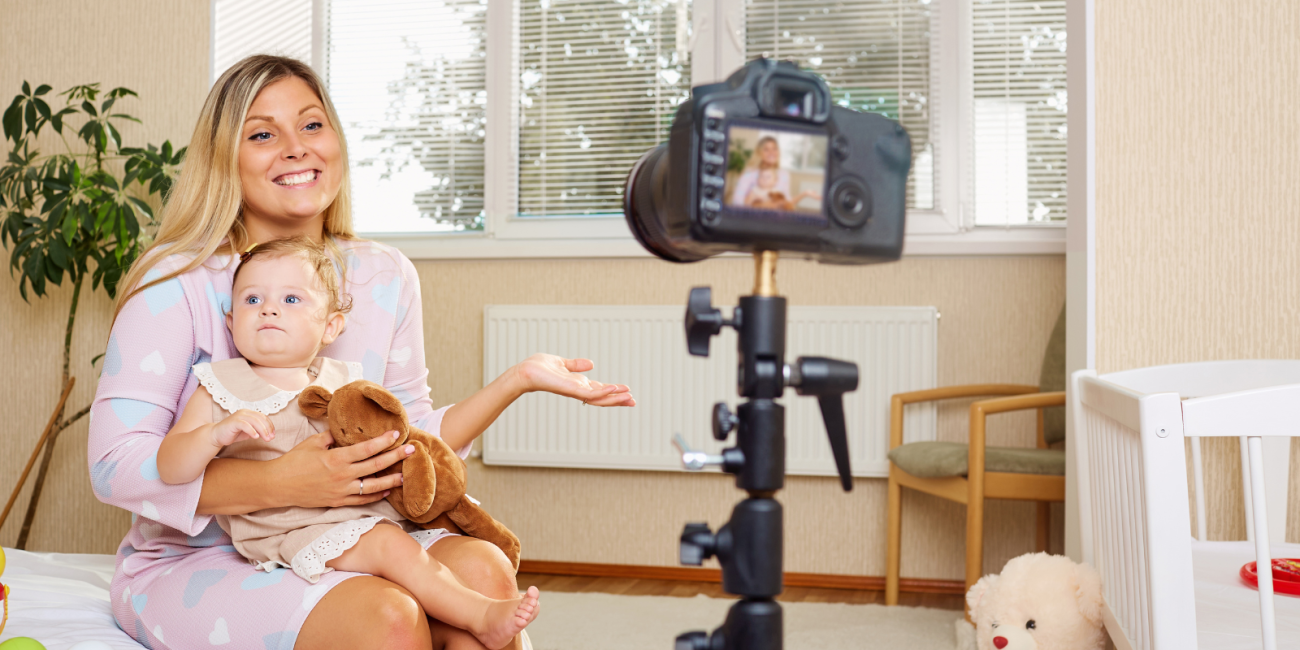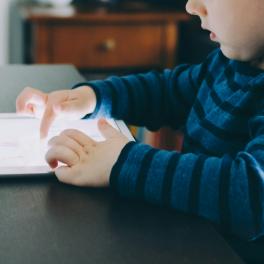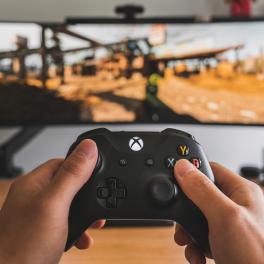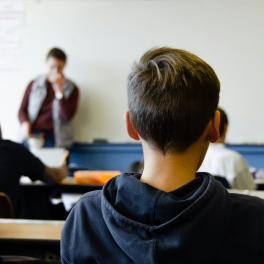
Lots of us are probably accustomed to the odd holiday picture doing the rounds on Facebook or Instagram without consent. Thanks to social media, that oh-so-awkward photo that you wish would disappear unfortunately doesn’t always end up in a dusty album on the back of a shelf. Now almost anyone, anywhere, can see your best and worst moments.
But some parents take this trigger-happy sharing to new levels by earning money from posting their children online. ‘Family vloggers’, or ‘Sharenters’, have created empires on YouTube, TikTok and Instagram, with many boasting millions of dollars in wealth from advertising, merch and brand deals. Children – or ‘kidfluencers’ – are often centre stage of their parent’s trademark content, filmed doing ‘childlike’ activities from unboxing presents and playing with toys, to tears and tantrums.
Recently, though, this popular genre has been shrouded with controversies and allegations that has forced much of its audience to sit back and think about the ethics behind such extreme sharing of children online.
Of course, no one wants to suggest that parents don’t care about their children beyond a paycheck. But exposing them to a largely unregulated and extremely opinionated audience is a decision full of risk. It’s something that younger minors, in particular, simply cannot consent to.
We want to ask: what happens when ‘play’ is ‘work’?
Obliviously earning
At not even two years old Rue is TikTok famous, with 1.2 million followers (June 2023) gushing over her high-chair antics at meal times. Her parents are keen to promote baby-led weaning, a parenting technique that helps very young children familiarise themselves with lots of different foods.
Controversially, the level of exposure Rue gets is how her parents make money – and some sceptics have questioned why she needs to be on camera. Afterall, a baby doesn’t have to be filmed and posted online to share parenting advice.
One doesn’t have to look far to identify the ‘cute baby’ = money business model. The ‘Moon and Rue’ website that sells child bibs for £19.99, as well as an Amazon Storefront, would not be anywhere near as profitable if Rue wasn’t the star of the show.
“It’s exploitation, and I get weird vibes from the amount of saves she gets on her videos. You can’t convince me that 13k+ people are just interested in revisiting the video for the baby-led weaning.” – Reddit user
“I’ve only seen people duetting their videos and talking about being obsessed with the baby, so even if it wasn’t exploitation (it is because their content revolves around the kid), it’s concerning that people are developing a parasocial relationship with that baby already and the parents don’t care.” – Reddit user
If Rue is being monetised, no matter how innocently, surely placing her in front of a camera is ‘work’, even when it looks like ‘play’. There are currently no labour laws in place to protect child social media stars from exploitation, nor are there any laws that require children to receive a cut of the money they help earn. Indeed, parents and YouTube stars Cole and Savannah LaBrant, whose six-year-old daughter Everleigh is a regular addition on their channel, did not respond when asked if they pay Everleigh a percentage of their YouTube revenues or have a savings account for her.
“It’s screwed up how those kids don’t have any protections labour wise. Their faces are plastered for millions and they may not ever get a break or privacy or even see a single dime.” Reddit user
“This is something I've wondered about - especially when you consider how many Youtube kids are born for the sole purpose of content, or how many kids get pulled out of school to look after the younger ones or live the 'van life'.” – Reddit user
One of the richest ‘kidfluencers’ of all time, is 12-year-old Ryan from the YouTube channel Ryan’s World. His family have reportedly amassed a net worth of 100 million dollars from Ryan’s toy ‘unboxing’ videos, where he unboxes different products and reacts to them. In 2017, his parents set up their own production company called Sunlight Entertainment, developing “family-friendly content” that is “driven to help kids learn.” It has a workforce of 30 staff that run eight YouTube channels, releasing about 25 videos a week.
Ryan’s World hasn’t been without controversy. Four years ago (2019), Ryan and his family were accused of exploiting the ‘unboxing’ business model by not disclosing sponsorship deals. This put Ryan, who was only nine at the time, at the forefront of a scandal that violated advertising laws. But as a child himself, how could Ryan have ever known that his ‘play’ was breaking the rules?
Child neglect
There are some children whose parents seem to have always had the goal of fame – and this is illustrated in the videos they post.
In April this year (2023), a mum vlogger accidentally uploaded an unedited video that featured her nine-year-old son crying over their puppy’s illness. “Act like you're crying”, she tells him as she poses for a thumbnail. “I am crying”, he tearfully responded.
The internet did not react well to the video, with many expressing disgust over the apparent manipulation.
“I will NEVER understand showing your child breaking down on the internet. You’re supposed to protect them.” – Twitter user
“This is so DISTURBING what is wrong with mom vloggers omfg.” – Twitter user
“Wow... I feel so sad for that little boy. Instead of being able to feel his feelings he has to put on a show for his mom’s insta.” – Twitter user
“This is not just disturbing, it's disgusting and manipulative, signs of a narcissist. That sudden stop of tears and then forcing her son to look more upset then he already is - is worth a look from authorities in my opinion. What else is she forcing him to do for the camera?” – Twitter user
The mum vlogger apologised for her actions. “It was so disgusting of me, I should not have done that at all. I re-watched it and you guys are completely right."
She has since deleted her YouTube page and has gone off the radar.
Using children for clickbait content has had serious consequences in the past. YouTubers FamilyOFive (originally known as DaddyOFive), were convicted of child neglect in 2017, following a spat of videos uploaded to YouTube that showed them ‘pranking’ their youngest son by accusing him of bad behaviour, cursing at him, and smashing his electronics.
In another video, the father, Martin, instructed his children to slap his daughter in the face. “You should never, ever hit a woman,” he says, “but this is your sister, so it doesn’t count.”
The parents lost custody of two of the children and pleaded guilty to two counts of child neglect but continued posting YouTube videos which were subsequently removed. They haven’t posted since 2019.
FamilyOFive demonstrates the extreme side of ‘kidfluencing’; choosing content over their children’s wellbeing which sadly resulted in authorities taking action. While not all family vloggers are culprits in this behaviour, the significance of the FamilyOFive case highlights what happens to some pint-sized social media stars behind closed doors.
“I didn’t have a single private moment. My mom woke me up with the camera on, and she often filmed right until we went to sleep.” – former kidfluencer (Reddit)
“My mom considered homeschooling us so that she’d have more time to make content during the day.” – former kidfluencer (Reddit)
“My siblings and I were so paranoid there were cameras on us that the only place we felt comfortable changing was in the bathroom with the lights off.” – former kidfluencer (Reddit)
Why are attitudes changing?
The internet, in all its wonder, is arguably neonate. It hasn’t been around long, yet it’s moving fast. And Web 2.0 – the participatory age – brings new ramifications that are causing laws and legislation to adapt at record paces.
It is troubling that many kidfluencers have little to no control over what part of their lives are shared, and that that control often falls into the hands of the very people who are meant to protect them. Afterall, would any child really be happy with a bunch of strangers watching their most private moments?
“I think it's super creepy that I can look at a picture of a kid/s that I've never even met and have no relation to and know their names, ages, what grade they're in, their favourite foods and colours and hobbies, etc.” – Reddit user
These complexities have compelled many to reconsider what they’re enforcing when interacting with family vlogger content. Can children really consent? Where does the money go? Is it exploitative? And who exactly is watching?
I feel like there are going to be a lot of lawsuits in the future. Emancipation cases, suing for earnings, suing to have content removed, etc. – Reddit user
Changing attitudes aren't just growing among audiences; parents are also removing their children from the limelight. Lack of control over where content is repurposed, and concerns over predatory behaviour seem to be flipping the mindset of many parents who post their children online.
“I watched a tiktok where a woman spoke about why she wasn't going to post her toddler on the platform anymore. Hundreds of thousands of people had saved and favorited one video in particular. Most of the usernames of those who saved the video were just blanks with no content or profile picture. It really scared her because she looked into other popular videos of kids and they had all been saved thousands of times too.” – Reddit user
Even some of the biggest stars are having second thoughts. Controversial leaders of the family vlogging genre, The Ace Family and SacconeJolys, claim they will retire their children from frequent posting, citing pressure and social awareness as two of the biggest issues. “If you're a parent and you have children, you know how socially aware your children are, and that's when I started thinking, maybe it’s time to not only stop doing it but also to sort of erase it”, explained Jonathan Joly, parent and owner of the SacconeJoly YouTube channel.
There is little taste left for family vloggers. Audiences are more aware, and the ‘original’ kidfluencers are growing up and speaking out. It seems, then, that the reign of the family vlogger empire is falling – and many are happy for it to stay that way.
“I hate it. I mean, imagine that you are the child of such a parent. You don't want every detail of your life to be on social media, but you don't have a choice. Your parents force you to be in their videos and selfies. They share every detail of your life online. Your school grades, your behavioural issues, how you got bullied, your first relationship... You cannot keep everything private. You don't get a say in this. It's awful.” – Reddit user.
Support Young Creators Like This One!
VoiceBox is a platform built to help young creators thrive. We believe that sharing thoughtful, high-quality content deserves pay even if your audience isn’t 100,000 strong.
But here's the thing: while you enjoy free content, our young contributors from all over the world are fairly compensated for their work. To keep this up, we need your help.
Will you join our community of supporters?
Your donation, no matter the size, makes a real difference. It allows us to:
- Compensate young creators for their work
- Maintain a safe, ad-free environment
- Continue providing high-quality, free content, including research reports and insights into youth issues
- Highlight youth voices and unique perspectives from cultures around the world
Your generosity fuels our mission! By supporting VoiceBox, you are directly supporting young people and showing that you value what they have to say.





